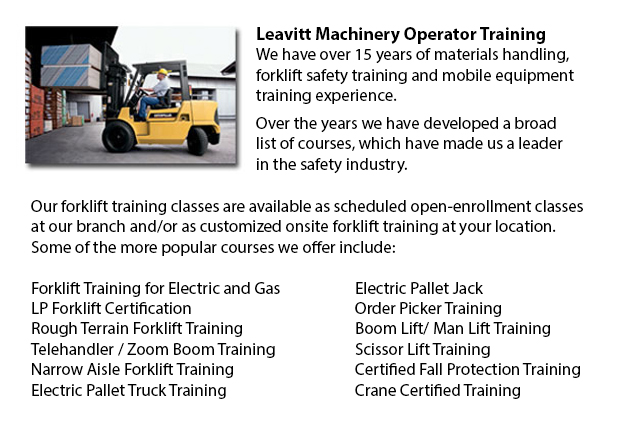
Hamilton Forklift Certification Schools - Forklift Certification is mandatory in North America. Hence, forklift training programs are important both for businesses and for people searching for jobs in industries as operators of forklifts. Forklift training focuses on health and safety issues included in making use of forklifts. Safety issues affect both the forklift driver and employees and other individuals who are near the forklift. Businesses may be subject to penalties if they are caught with un-certified drivers during a check up. There are various convincing reasons why businesses must abide by forklift standards.
Before the worker or trainee is certified to operate a forklift, nearly all federal, state, and provincial rules will need the employee undergo an evaluation of the skills needed for forklift safety. There are numerous forklift certification schools offering courses for employees and there are likewise schools that offer online forklift training. Nonetheless, employers must be aware that forklift certification training is not "just a test". Right forklift training must comprise various areas of study, like for instance theory and hands-on practice. Regulations do not require employers to have an outside organization to certify forklift drivers.
The recommended curriculum for a quality forklift certification service includes both classroom training and an on-site component. Classroom training normally features informative sessions with videos, power point presentations, models and discussions. Students usually are needed to write a test to check for subject matter understanding. Certificates of completion are issued upon successfully finishing the class.
An evaluation of the student's use of the equipment comprises pre-operational equipment inspections, knowledge of job site hazards, operational instruction and a pass/fail operational test.
The following subject areas would normally be covered in the training: Understanding legislations and regulations; Controls & Instrumentation; Steering and Maneuvering; Engine maintenance and Operation; Fork and Attachment Limitations, Visibility; Rated Capacities, Stability, Inspection & Maintenance; Refueling; Load Manipulation; Dangerous Places & Rough Terrain Operations and Pedestrians. Moreover, there are training courses available for workers who are transitioning to new job positions.
-
Hamilton Aerial Platform Training
Hamilton Aerial Platform Training - Aerial hoists are able to accommodate various odd jobs involving high and hard reaching spaces. Often utilized to perform routine repair in structures with high ceilings, prune tree branches, hoist heavy shelving u... More -
Hamilton Heavy Equipment Operator Certification
Hamilton Heavy Equipment Operator Certification - The heavy equipment operator is a person who manipulates the controls and drives different kinds of big machinery. Heavy machinery is most commonly utilized on construction sites to deliver supplies t... More -
Hamilton Scissor Lift Ticket
Hamilton Scissor Lift Ticket - Scissor lifts have greatly benefited construction operations in view of the fact that the job that used to require much effort and lots of people, can now be completed utilizing the scissor lift truck and only one indiv... More -
Hamilton Forklift Certification Courses
Hamilton Forklift Certification Courses - Forklift certification courses really help to make sure that businesses utilizing forklifts, comply with the regional and local rules. The drivers of the forklift should undergo forklift certification prior t... More -
Hamilton Forklift Training Program
Hamilton Forklift Training Program - The forklift is a common powered industrial vehicle which is in wide use these days. They are occasionally called jitneys, hi los or lift trucks. A departments store would use the forklift to unload and load merch... More -
Hamilton Forklift License
Hamilton Forklift License - Obtaining a forklift license or forklift certification in North America would require the trainee to do hands-on training in addition to classroom instruction. The state, provincial and federal regulatory bodies are respon... More -
Hamilton Manlift Operator Certification
Hamilton Manlift Operator Certification - Our aerial lift and scissor platform training and certification empowers participants with a general understanding and knowledge of the efficient and safe use of "Power Operated Mobile Work Platforms," under... More -
Hamilton Forklift Operator Certification
Hamilton Forklift Operator Certification - Forklift operator certification is usually needed for employees working in industrial, warehouse or construction setting to guarantee the safe utilization of forklifts. Workplace training has to follow a met... More

Forklift Certification Hamilton
TOLL FREE: 1-888-254-6157
Hamilton, Ontario
forkliftcertificationhamilton.com
Email Us
About Us


